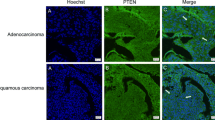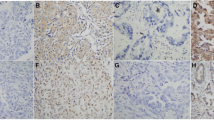Abstract
Reduced nuclear p27 expression is associated with a poor outcome in various cancers, including non-small cell lung cancer (NSCLC). Cytoplasmic p27 expression was shown to be associated with an unfavorable response to chemotherapy and poor outcomes in some carcinomas, but it has not been well studied in NSCLC. Herein, p27 expression in 219 tumors surgically resected from NSCLC patients was evaluated by immunohistochemistry (IHC). The most common of p27 immunostaining in lung tumors was observed in the cytoplasm (N−/C+, 32 %), followed by negative (N−/C−, 29 %), nucleus (N+/C−, 24 %), and nucleus plus cytoplasm (N+/C+, 15 %). Kaplan–Meier and Cox regression models showed that p27 N−/C+ tumors exhibited the worst overall survival (OS) and relapse-free survival (RFS) among the four categories of tumors. Among 135 of 219 patients who received cisplatin-based chemotherapy, p27 N−/C+ tumors most commonly showed an unfavorable response to cisplatin-based chemotherapy, followed by p27 N−/C− tumors when p27 N+/C− tumors were used as a reference. IHC analysis for phosphorylated extracellular signal-regulated kinase (p-ERK) and Bcl-2 expression in the lung tumors was performed to test whether ERK activation could enhance p27 nuclear export and the expression of Bcl-2 to test whether ERK activation could enhance p27 nuclear export and Bcl-2 expression. The data showed that p-ERK expression was positively correlated with cytoplasmic p27 (N−/C+) and Bcl-2 expression in the lung tumors. Patients with high Bcl-2-expressing tumors treated with cisplatin-based chemotherapy showed unfavorable predictive values in a subset of this study population. Therefore, we suggest that cytoplasmic p27 (N−/C+) via ERK-activated Bcl-2 expression may predict an unfavorable response to cisplatin-based chemotherapy and poor outcomes in NSCLC.


Similar content being viewed by others
References
Soos TJ, Kiyokawa H, Yan JS, Rubin MS, Giordano A, DeBlasio A, et al. Formation of p27-CDK complexes during the human mitotic cell cycle. Cell Growth Differ Mol Biol J Am Assoc Cancer Res. 1996;7:135–46.
Tsukamoto S, Sugio K, Sakada T, Ushijima C, Yamazaki K, Sugimachi K. Reduced expression of cell-cycle regulator p27(Kip1) correlates with a shortened survival in non-small cell lung cancer. Lung Cancer. 2001;34:83–90.
Sgambato A, Migaldi M, Faraglia B, Garagnani L, Romano G, De Gaetani C, et al. Loss of p27Kip1 expression correlates with tumor grade and with reduced disease-free survival in primary superficial bladder cancers. Cancer Res. 1999;59:3245–50.
Hayashi H, Ogawa N, Ishiwa N, Yazawa T, Inayama Y, Ito T, et al. High cyclin E and low p27/Kip1 expressions are potentially poor prognostic factors in lung adenocarcinoma patients. Lung Cancer. 2001;34:59–65.
Esposito V, Baldi A, De Luca A, Groger AM, Loda M, Giordano GG, et al. Prognostic role of the cyclin-dependent kinase inhibitor p27 in non-small cell lung cancer. Cancer Res. 1997;57:3381–5.
Osoegawa A, Yoshino I, Tanaka S, Sugio K, Kameyama T, Yamaguchi M, et al. Regulation of p27 by S-phase kinase-associated protein 2 is associated with aggressiveness in non-small-cell lung cancer. J Clin Oncol. 2004;22:4165–73.
Shin I, Yakes FM, Rojo F, Shin NY, Bakin AV, Baselga J, et al. PKB/Akt mediates cell-cycle progression by phosphorylation of p27(Kip1) at threonine 157 and modulation of its cellular localization. Nat Med. 2002;8:1145–52.
Kim J, Jonasch E, Alexander A, Short JD, Cai S, Wen S, et al. Cytoplasmic sequestration of p27 via AKT phosphorylation in renal cell carcinoma. Clin Cancer Res. 2009;15:81–90.
Psyrri A, Bamias A, Yu Z, Weinberger PM, Kassar M, Markakis S, et al. Subcellular localization and protein levels of cyclin-dependent kinase inhibitor p27 independently predict for survival in epithelial ovarian cancer. Clin Cancer Res. 2005;11:8384–90.
Ananthanarayanan V, Deaton RJ, Amatya A, Macias V, Luther E, Kajdacsy-Balla A, et al. Subcellular localization of p27 and prostate cancer recurrence: automated digital microscopy analysis of tissue microarrays. Hum Pathol. 2011;42:873–81.
Grabowski P, Schrader J, Wagner J, Horsch D, Arnold R, Arnold CN, et al. Loss of nuclear p27 expression and its prognostic role in relation to cyclin E and p53 mutation in gastroenteropancreatic neuroendocrine tumors. Clin Cancer Res. 2008;14:7378–84.
Chen G, Cheng Y, Zhang Z, Martinka M, Li G. Prognostic significance of cytoplasmic p27 expression in human melanoma. Cancer Epidemiol Biomarkers Prev. 2011;20:2212–21.
Denicourt C, Saenz CC, Datnow B, Cui XS, Dowdy SF. Relocalized p27Kip1 tumor suppressor functions as a cytoplasmic metastatic oncogene in melanoma. Cancer Res. 2007;67:9238–43.
Shen J, Yin JY, Li XP, Liu ZQ, Wang Y, Chen J, et al. The prognostic value of altered eIF3a and its association with p27 in non-small cell lung cancer. PLoS One. 2014;9:e96008.
Porter PL, Barlow WE, Yeh IT, Lin MG, Yuan XP, Donato E, et al. p27(Kip1) and cyclin E expression and breast cancer survival after treatment with adjuvant chemotherapy. J Natl Cancer Inst. 2006;98:1723–31.
Moreno-Galindo C, Hermsen M, Garcia-Pedrero JM, Fresno MF, Suarez C, Rodrigo JP. P27 and BCL2 expression predicts response to chemotherapy in head and neck squamous cell carcinomas. Oral oncology 2013.
Stendahl M, Nilsson S, Wigerup C, Jirstrom K, Jonsson PE, Stal O, et al. p27Kip1 is a predictive factor for tamoxifen treatment response but not a prognostic marker in premenopausal breast cancer patients. Int J Cancer. 2010;127:2851–8.
Andre F, Conforti R, Moeder CB, Mauguen A, Arnedos M, Berrada N, et al. Association between the nuclear to cytoplasmic ratio of p27 and the efficacy of adjuvant polychemotherapy in early breast cancer. Ann Oncol Off J Eur Soc Med Oncol ESMO. 2012;23:2059–64.
Serres MP, Zlotek-Zlotkiewicz E, Concha C, Gurian-West M, Daburon V, Roberts JM, et al. Cytoplasmic p27 is oncogenic and cooperates with Ras both in vivo and in vitro. Oncogene. 2011;30:2846–58.
Kfir S, Ehrlich M, Goldshmid A, Liu X, Kloog Y, Henis YI. Pathway- and expression level-dependent effects of oncogenic N-Ras: p27(Kip1) mislocalization by the Ral-GEF pathway and Erk-mediated interference with Smad signaling. Mol Cell Biol. 2005;25:8239–50.
Wu DW, Wu TC, Wu JY, Cheng YW, Chen YC, Lee MC, Chen CY, Lee H. Phosphorylation of paxillin confers cisplatin resistance in non-small cell lung cancer via activating ERK-mediated Bcl-2 expression. Oncogene 2013.
Tsai LH, Chen PM, Cheng YW, Chen CY, Sheu GT, Wu TC, Lee H. LKB1 loss by alteration of the NKX2-1/p53 pathway promotes tumor malignancy and predicts poor survival and relapse in lung adenocarcinomas. Oncogene 2013.
Wu HH, Wu JY, Cheng YW, Chen CY, Lee MC, Goan YG, et al. cIAP2 upregulated by E6 oncoprotein via epidermal growth factor receptor/phosphatidylinositol 3-kinase/AKT pathway confers resistance to cisplatin in human papillomavirus 16/18-infected lung cancer. Clin Cancer Res. 2010;16:5200–10.
Zhuang Y, Yin HT, Yin XL, Wang J, Zhang DP. High p27 expression is associated with a better prognosis in East Asian non-small cell lung cancer patients. Clin Chim Acta Int J Clin Chem. 2011;412:2228–31.
Liang J, Zubovitz J, Petrocelli T, Kotchetkov R, Connor MK, Han K, et al. PKB/Akt phosphorylates p27, impairs nuclear import of p27 and opposes p27-mediated G1 arrest. Nat Med. 2002;8:1153–60.
Wander SA, Zhao D, Slingerland JM. p27: a barometer of signaling deregulation and potential predictor of response to targeted therapies. Clin Cancer Res. 2011;17:12–8.
Cohen JD, Tham KY, Mastrandrea NJ, Gallegos AC, Monks TJ, Lau SS. cAMP-dependent cytosolic mislocalization of p27(kip)-cyclin D1 during quinol-thioether-induced tuberous sclerosis renal cell carcinoma. Toxicol Sci Off J Soc Toxicol. 2011;122:361–71.
Tazat K, Harsat M, Goldshmid-Shagal A, Ehrlich M, Henis YI. Dual effects of Ral-activated pathways on p27 localization and TGF-beta signaling. Mol Biol Cell. 2013;24:1812–24.
Steelman LS, Franklin RA, Abrams SL, Chappell W, Kempf CR, Basecke J, et al. Roles of the Ras/Raf/MEK/ERK pathway in leukemia therapy. Leukemia. 2011;25:1080–94.
Zhang W, Tan W, Wu X, Poustovoitov M, Strasner A, Li W, et al. A NIK-IKKalpha module expands ErbB2-induced tumor-initiating cells by stimulating nuclear export of p27/Kip1. Cancer Cell. 2013;23:647–59.
Wang J, Zhou JY, Wu GS. ERK-dependent MKP-1-mediated cisplatin resistance in human ovarian cancer cells. Cancer Res. 2007;67:11933–41.
Acknowledgments
This work was jointly supported by grants from the National Health Research Institute (NHRI-EX103-10328BI) and the Ministry of Science and Technology (MOST103-2320-B-038-036-MY2) Taiwan.
Author information
Authors and Affiliations
Corresponding author
Ethics declarations
Compliance with ethical standards
The IRB approval was accepted by the hospital’s institutional review board (Institutional Review Board, Chung Shan Medical University Hospital; No. CS07115).
Conflicts of interest
None
Additional information
Tsang-Chi Lin and Lung-Hung Tsai contributed equally to this work.
Rights and permissions
About this article
Cite this article
Lin, TC., Tsai, LH., Chou, MC. et al. Association of cytoplasmic p27 expression with an unfavorable response to cisplatin-based chemotherapy and poor outcomes in non-small cell lung cancer. Tumor Biol. 37, 4017–4023 (2016). https://doi.org/10.1007/s13277-015-4272-7
Received:
Accepted:
Published:
Issue Date:
DOI: https://doi.org/10.1007/s13277-015-4272-7




